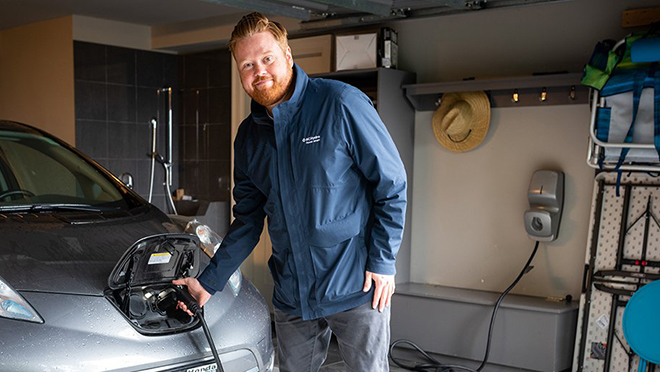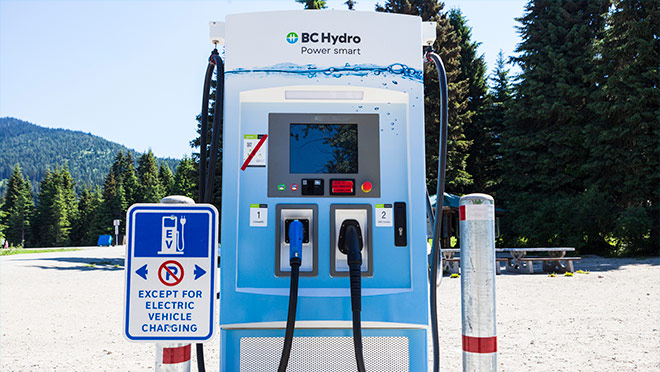Want an EV? Be patient, or consider used

Demand for top-selling models means you may need to wait
Demand for electric vehicles in B.C. has hit a new high with one in every six new vehicles sold in the province being an EV. That's the highest in Canada, and well over twice the rate of sales in Ontario.
Those B.C. sales numbers would likely be even higher if auto manufacturers could keep up to the appetite for EVs. Waitlists of up to a year or longer are common for popular rebate-eligible models as consumers react to a surge in the number of options available – most of them with considerably longer battery range than even two years ago.
If you're thinking about getting a new EV, we've recently tuned up our list of models available in B.C. There are new filtering options to narrow your search, more details on each vehicle, and direct-from-manufacturers data to keep you up to speed on the latest models.
The good news is that there's a lot of choice. But global supply chain issues for both gas-powered and electric vehicles mean that it may take awhile to get the vehicle you really want.
At the heart of the car supply shortage is a backlog in computer chip orders resulting from a shutdown of computer chip factories in Asia during the pandemic. Fewer computer chips combined with a surge in demand means fewer cars available.
So what is a wannabe EV owner to do?
Option A: Be flexible, get your order in soon
If you're someone who'd like an EV with good range for under $60,000, which is the maximum for potential rebates of up to $9,000, you're far from alone. Demand for popular vehicles in particular – such as Hyundai's Ioniq 5 and Kona Electric, Kia EV6, Volkswagen ID.4, Nissan Leaf, and Chevy Bolt – can far exceed demand and lead to wait times of up to a year or more. If you're willing to wait, the best value is to order directly from the factory to get the trim you want and lock in the price.
Here are a few other things to keep in mind:
- Flexibility on make, model, and features (especially tech upgrades) can help you get an EV earlier. Currently, Tesla has the shortest wait time for new vehicles, but that is expected to change when production constraints ease. If you're willing to do some searching, there are dealers with EVs currently on their lots, it may just take a bit of research.
- The eventual cost of your car could go up. In cases of extended delivery wait times, consumers are reporting price increases and/or additional charges for models that became available, often with additional features they didn't originally want to pay for.
- While you wait, use rebates to get a charger installed at home: Rebates of up to $600 – when the new top-up for smart charger models is included – are available on the cost of purchase and installation of chargers in single-family homes.
Option B: Consider a used EV
As the number of new EV models expands, a lot of earlier-adopting EV owners are looking to upgrade. The result is a surge in the availability of used EVs.
That can be particularly good news for those who plan to use an EV mainly for city use and shorter trips and who don't require extended range. Many earlier models with battery packs that have lost 10% or more of their original range – notably earlier-model Nissan Leafs – are available at modest prices. But those seeking popular recent models with low mileage will discover minimal discounts, and in some cases, higher prices than the original purchase cost. According to a Vision Mobility report [PDF, 95 KB] the price of used EVs are expected to come down later this year once the supply of new EVs increases.
One popular online used car website currently lists nearly 800 available EVs in B.C., including 19 older-model EVs listed at $20,000 or less. The bulk of the vehicles on the site are newer-model vehicles driven less than 50,000 km, mainly Teslas.
Daryl Croft, president of the Toronto-area Electric Vehicle Network that rents and sells used EVs has loads of experience dealing used plug-ins. He says there are a variety of reasons buyers are looking at used EVs. And some are willing to pay a premium to have the car they want immediately, even if buying used also means they can't take advantage of government new-car rebates.
"You may be willing to wait two years to get a new car and the rebate," says Croft. "But two things happen between when you order and when you get the new vehicle. One is you could burn through $5,000 or $10,000 in fuel and maintenance costs in your gas-powered vehicle while you wait. And you could find out that the price you eventually pay is higher than it was when you put in your order."
Croft has firsthand knowledge of this. He says he needed to pay an extra $13,000 to stay in the queue for the popular Ford F-150 Lightning pickup, but that he paid it because he didn't think it was unreasonable, and really wanted the pickup.
Here are a few tips and considerations from Croft when searching and buying an EV:
- Don't focus on the potential cost of replacing a battery pack: "Manufacturers' battery warranties are often for at least eight years or 160,000 kms," he says. "Even if you buy a two-year-old car, you're likely to resell it before the warranty expires. And people forget that engines and transmissions in gas vehicles can fail and are expensive to replace."
- Check the range and health of the battery pack: A qualified service technician can plug in a diagnostic tool that determines if the EV's battery is healthy.
- Check the tires: Croft says that while maintenance of EVs is much less costly, the one exception is tires. He says EV tires tend to cost more and wear out earlier because battery packs make the cars heavier, EVs accelerate quickly, and because EV tires are designed with a rubber that maximizes "rolling" efficiency over longevity. Check that tires are of good quality, don't show excessive wear, and that they're load-rated to match the vehicle.
- Check the suspension: Similar to the tire issue, an EV's suspension deals with more weight and can potentially wear more quickly. Make a suspension check part of an overall inspection of the vehicle you're looking at.
- Check for outstanding recalls: Get the VIN number of the vehicle, says Croft, and use it to check online to ensure any recalls have been dealt with.
Related:
